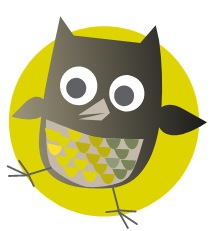Looking up an unfamiliar word in the dictionary can be a daunting task for many children.
Without specially written definitions suited to their reading level, using a dictionary will be frustrating and discouraging, with each new definition using more confusing words than the last! Encouraging your child to use an appropriate dictionary on their own terms can really help them become an enthusiastic, independent reader.
Here are four things to consider when choosing a dictionary for your child.
1. Is it pitched at the right age for your child? Is it age-appropriate?
At best, a good dictionary can stimulate children to widen their vocabulary proactively, by researching the new words they encounter day to day. At worst, an inappropriate dictionary will bore or alienate your child with wordy definitions or overly childish pictures.
Children’s dictionaries generally have a clearly defined age guide, which is a good place to start. It’s also worth bearing in mind that some children acquire reading and writing skills more readily than others, which is completely normal! Buying a dictionary together can be a good way to make the experience fun for your child, while ensuring that they find the definitions engaging. A good child’s dictionary will contain example sentences which children will relate to: they ‘walk’ to the park, they don’t ‘walk’ to work.
2. Dimensions
Is your child willing to lug a hardback dictionary, thesaurus, and the full works of Shakespeare to school every day? A wide variety of formats are available to suit your particular needs, from large, brightly coloured picture dictionaries for young children to our all-in-one Mini Dictionary and Thesaurus which easily fits into a school bag.
3. Extra features
Many dictionaries come with special appendices, pictures, grammatical rules and more. Some children’s dictionaries come with jokes, anagrams, and rhyming words, while others contain creative writing tips from beloved children’s authors. It’s always worth doing a little research to find a dictionary with extra features which are useful and interesting to your child.
Oxford dictionaries often come with supplemental guides, worksheets and games that you can download online. You’ll find some free word games further down this page.
4. Design & themes
Choosing a design or theme which resonates which your child is important at any age. A young Roald Dahl fanatic will of course be drawn to our Roald Dahl Dictionary, full of Quentin Blake’s iconic illustrations and Dahl’s inimitable vocabulary.
The Oxford First Illustrated Dictionary contains lovely hand-drawn illustrations by Emma Chichester Clark, and is full of popular characters from children’s stories and fairy tales. The Oxford First Dictionary, on the other hand, features computer-generated images which may appeal to children who prefer computer games to bedtime stories!
You’ll find some of our best-selling children’s dictionaries further down this page.
Why we need dictionaries for children
What’s it like to work in children’s publishing, as the Publisher for Children’s Dictionaries? Sam talks about what her job involves and why she loves it!
Introduction to Dictionary Skills
An introduction to first dictionary skills, to help every child understand how to use dictionaries to find the words they need, and enrich their language.
Oxford First Dictionary
Suitable for children aged 5–7
The perfect first dictionary, guaranteed to give a love of language for life!
This dictionary includes fun word jokes for children and more information on time, seasons, the body and question words, along with the alphabet, numbers, colours and shapes.
First Illustrated Dictionary
Suitable for children aged 5–7
Beautifully illustrated by well-known picture book artist Emma Chichester Clark, this book is the perfect first building block for 5–7 year-olds to engage with words and language.
Over 2000 entries give clear meanings and definitions, parts of speech, word forms, word families, synonyms and opposites to build vocabulary and first literacy skills.
Phonics Spelling Dictionary
Suitable for children aged 5–7
Using the Oxford Reading Tree Floppy’s Phonics Sound and Letters Programme and synthetic phonics, the Oxford Phonics Spelling Dictionary helps children become proficient readers and spellers.
With 4000 words, ordered by sounds and spellings and linked to the Alphabetic Code Chart, it makes preparing for the phonics screening check simple and fun.
Children’s Rhyming Dictionary
Suitable for children aged 7+
Poetry and creative writing is fun with the Oxford Children’s Rhyming Dictionary, in the classroom and at home.
With inspiring poems by John Foster, quirky illustrations and engaging creative writing activities, this alphabetical rhyming dictionary gives over 3000 rhyming words to help children to write their own poems, riddles, and nonsense verse.
Oxford Roald Dahl Dictionary (Paperback)
Suitable for children aged 8+
Lots of dictionaries tell you what an ‘alligator’ is, or how to spell ‘balloon’, but they won’t explain the difference between a ‘ringbeller’ and a ‘trogglehumper’, or say why witches need ‘gruntles’ eggs’, or suggest a word for the shape of a ‘Knid’. This dictionary does all those things.
All the words that Roald Dahl invented are here, like ‘biffsquiggled’ and ‘whizzpopping’, to remind you what means what, but that is not all. You’ll also find out where words came from, rhyming words, synonyms and lots of alternative words for words that are overused.
Mini School Dictionary & Thesaurus
Suitable for children aged 10–11
The Oxford Mini School Dictionary & Thesaurus is the ideal one-volume quick reference tool for the school bag. It is the only one of its kind for students ten years plus, ideal for primary school leavers about to start secondary school.
Each page has the dictionary entries at the top with the companion thesaurus entries at the bottom making it easy to find the right words quickly. The dictionary contains clear simple definitions, up-to-date example sentences, and support on spelling, grammar and punctuation.
More books
- Oxford First Grammar, Punctuation and Spelling Dictionary for ages 5–7.
- Oxford Primary Grammar, Punctuation and Spelling Dictionary for ages 8+.
- Oxford Primary Illustrated Maths Dictionary for ages 7–11.
- Oxford Primary Illustrated Science Dictionary for ages 8–11.
- More children’s dictionaries are listed in the bookshop.
More from Oxford Owl
- YouTube: Help your child develop early dictionary skills
- Blog: Why does your child need a dictionary?
Word games
Word games for age 5+
Activity: Plurals [PDF]
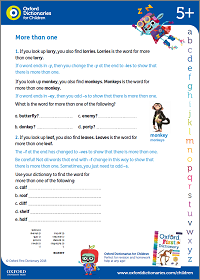
Find the plural for each of these words.
Activity: Putting things in order [PDF]
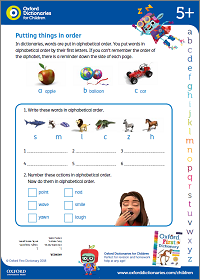
Put these words in alphabetical order.
Activity: Spotting synonyms[PDF]
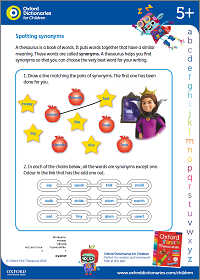
Match the pairs of synonyms.
Activity: Shapes word search [PDF]
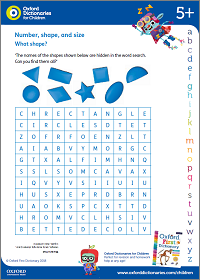
Can you find all the names of shapes hidden in this word search?
Activity: Word game [PDF]
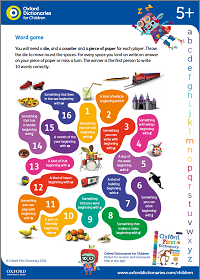
Can you solve the clues to find the right words?
Word games for age 7+
Activity: Putting words in alphabetical order [PDF]
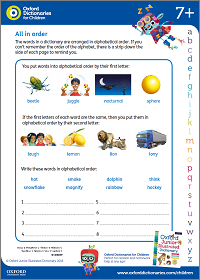
Put these words into alphabetical order.
Activity: How do you spell that? [PDF]
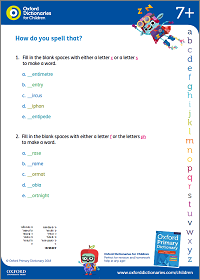
Fill in the blank spaces to make a word.
Activity: Know your ABC! [PDF]
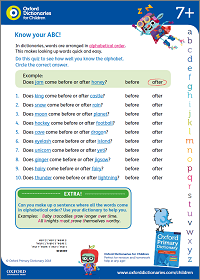
Do this quiz to see how well you know the alphabet.
Activity: Matching words [PDF]
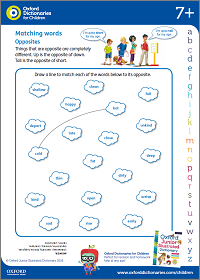
Draw a line to match each of the words below to its opposite.
Activity: Spotting synonyms [PDF]
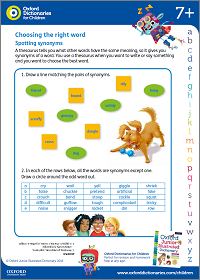
Match the pairs of synonyms.







